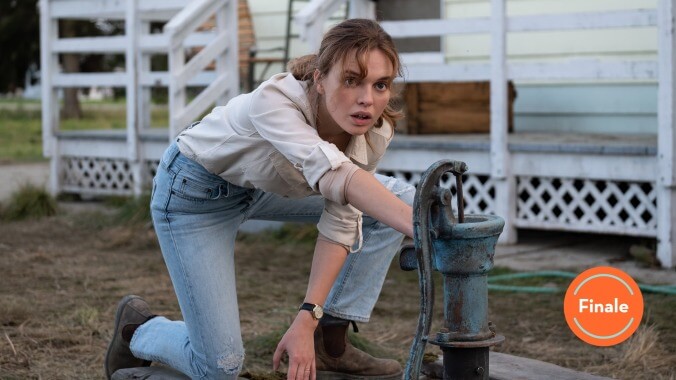After dropping a literal atomic bomb last episode, The Stand closes off its woefully uneven run with a quiet and very Biblical coda, written by Stephen King himself and carrying on past the point where the book ends. For that reason, there’s considerable tension and suspense even for readers of the original work. But the last-minute pontificating on the nature of humanity and good vs. evil that occurs in the spanse of this strange episode never achieves depth or sharpness. Instead, it merely flops around in its overly simplified moralizing.
There’s an immediate problem with character motivation in the mere premise of this coda. I’ll get into this more in the Strays, but yes, Frannie and Stu deciding to leave the safety of Boulder for uncertain life back in Frannie’s Maine hometown does stay true to the book. But it’s arguably the least compelling character choice that happens in the book, and to see it replicated here in the show only emphasizes just how porous of a story choice it is. But before we get to Frannie and Stu’s wild decision to leave Boulder, we’re treated to a montage narrated by Frannie that summarizes the time she and Stu spent apart, her not knowing whether he’s alive. She gives birth to her baby Abagail, who contracts Captain Tripps but recovers, the implication being that a child born of only one immune person can ultimately fight off the disease. Frannie muses on the ways Boulder is rebuilding itself, wondering if this new society will undo some of the sins of the past, wondering if something better will be built. Her musings on some truly intriguing stuff about humanity, society, and systems, but we never really see those things play out, The Stand distilling its commentary into merely, well, commentary.
Stu and Tom Cullen show up with movie-perfect timing during a somber town gathering, but the fortuitous big reunion between Stu and Frannie is actually much easier to suspend disbelief for than what follows. During a cheerful Fourth of July celebration, Frannie tells Stu she misses Maine. It tracks that she would be homesick. I’m sure most of the folks in Boulder are homesick, that longing compounded by the fact that everyone they knew back home is dead. But Frannie is really homesick—to the point where she wants to travel with Stu and the baby back across the country to the place where her journey began with Harold all those episodes ago. There are some clunky attempts to justify this choice: Stu and Frannie discuss the fact that Boulder has become loud. More people arrive every day. Three people have been locked up—for minor offenses, but Stu says it’s pretty much only a matter of time before murders start up.
Here, The Stand is taking a pretty explicit stance on society, suggesting that it will always inevitably become violent. But as with the Frannie voiceover, we sort of just scoot along. We’re never shown anything interesting about Boulder as a fledgling society attempting to rebuild things. There’s no nuance to anything Stu and Frannie are saying about where they think things are headed. Instead, it’s just wobbly justification for this rash decision. Frannie and Stu have previously proven to be smart, capable characters who have risen to great challenges. Frannie’s intuitions when it came to Harold were correct. Stu somehow survived breaking his leg alone in the wilderness. But now these two are uncharacteristically acting like total idiots, and there’s no real pause to consider the extent of their folly. How will they survive Maine’s winter without power? How will they care for their very young child if she gets sick? How will they find viable food and water and shelter without the support of a community like the one they have in Boulder? Sure, there are plenty of implausible things that occur in sci-fi television, but the complete lack of logic when it comes to Stu and Frannie’s plans is way too distracting. I suppose we’re meant to just accept that they’ll figure it out as they go, that their love for each other and the baby is enough to sustain them.
And also that they might receive a fair amount of help from divine intervention to eschew some of these concerns. The finale’s title promises that Frannie will end up in a well, and end up in a well she does indeed. There’s palpable suspense to Frannie and Stu’s arrival at an abandoned house, where all signs point toward danger and yet the characters are none the wiser. It’s the perfect horror set-up in that way, and it’s some of the scariest work the show has done so far, especially for The Stand’s readers who can’t know what will happen at this point. Flagg survived the blast, because Flagg is the ultimate Big Bad in that he can never truly be killed, only resisted. When Frannie inevitably tumbles into a well while Stu’s getting supplies, she encounters Flagg, who attempts to bend her to his will in exchange for her life, Stu’s, the baby’s. Frannie resists the temptation, flees Flagg and finds herself on Mother A’s porch. The Stand leans all the way into its Biblical influences in this dreamscape, Frannie ultimately rejecting the devil and embracing God.
In the living world, there’s still the issue of Frannie being at the bottom of a well. Stu shows up to find a young Black girl caring for the baby. She springs into action when he arrives, suddenly possessing the exact skills and knowledge to get Frannie out of the well. It’s implied that she’s a younger incarnation of Mother A. So The Stand doesn’t just replicate the dated magical Black character trope of the book; it doubles down on it. The mysticism surrounding Mother A and this girl all amounts to a well-trodden trope that doesn’t really provide the characters with specificity or humanity. They’re devices—quite explicitly here merely to ease the lives of two white characters. There’s nothing empowering or noble in this message that a young Black girl saves Frannie’s life. It’s an old trope gone stale, and The Stand’s finale really is one mushy, unsatisfying bite.
The finale similarly misfires in its exploitative depiction of indigenous people. Flagg tells Frannie that white settlers and smallpox destroyed this Native community, which is seen again at episode’s end when Flagg arrives to wreck havoc. None of these characters are named or given any actual consideration in the narrative other than to serve as set dressing and plot device. It’s a distinctly colonialist approach to showing that colonialism infected the world, which of course takes all the weight out of that message.
The Stand too often hints at saying something meaningful but then turns up empty. In the same way Boulder replicates the ways of the old world instead of inventing new ways to live life communally, The Stand replicates old tropes and dominant narratives without any semblance of imagination. It has reduced the end of the world to an uninspired game of chess that’s more concerned with outcomes than the paths that lead to them. In its nine episodes, it has been occasionally thrilling but too often goofy and overly simplistic. And in its final hour, despite brief moments of genuine suspense, it’s just dull.
Stray observations
- Here is your last and final reminder that here is where I put more fleshed out thoughts on show vs. book, so if you do not wish to be spoiled for the book, do not read on!
- Obviously, this is the episode that deviates the most from the original work, but when I first read that Stephen King was writing an alternate ending to the story, I had thought “oh, thank goodness, we’re not going to do that whole Frannie and Stu go back to Maine thing!” Oh how very wrong I was! It doesn’t make sense in the book, and it doesn’t make sense here. It just sort of turns Frannie from a smart and reasonable woman into the object of some overly romanticized story about two lovers braving the end of the world on their own.
- Stu and Tom Cullen’s time together trying to get back to Boulder is one of my favorite sections of the book, but I do somewhat understand that it doesn’t really scream TV action-adventure since it unfolds relatively slowly, but hasn’t that been the problem all along with this adaptation? The characters move around with ease and swiftness, their journeys condensed and stripped of all the most arduous bits that are in the book? I so often wish that this show would just pump its brakes a bit and let its characters feel stuck and tired. It would give so much more stakes to their adventures.









































